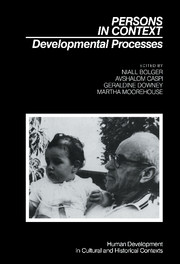Book contents
- Frontmatter
- Contents
- Preface
- Contributors
- 1 Development in context: research perspectives
- 2 Interacting systems in human development Research
- 3 Children, families, and communities: ways of viewing their relationships to each other
- 4 Human development and social change: an emerging perspective on the life course
- 5 Family process: loops, levels, and linkages
- 6 On the constructive role of problem behavior in adolescence
- 7 The sociogenesis of self concepts
- 8 Putting persons back into the context
- 9 How genotypes and environments combine: development and individual differences
- Author index
- Subject index
7 - The sociogenesis of self concepts
Published online by Cambridge University Press: 04 May 2010
- Frontmatter
- Contents
- Preface
- Contributors
- 1 Development in context: research perspectives
- 2 Interacting systems in human development Research
- 3 Children, families, and communities: ways of viewing their relationships to each other
- 4 Human development and social change: an emerging perspective on the life course
- 5 Family process: loops, levels, and linkages
- 6 On the constructive role of problem behavior in adolescence
- 7 The sociogenesis of self concepts
- 8 Putting persons back into the context
- 9 How genotypes and environments combine: development and individual differences
- Author index
- Subject index
Summary
Children's self ratings of such characteristics as popularity, affiliation, and aggression often bear modest relations to ratings obtained from peers and teachers, or to direct observations (e.g., Cairns & Cairns, 1984; Ledingham, Younger, Schwartzman, & Bergeron, 1982). Nonconvergence between measures from the self and those from other sources has been found as well in the assessment of “masculinity-femininity” (Sears, 1965), “conscience” (Hartshorne & May, 1928, 1929; Yarrow, Campbell, & Burton, 1968), and “dependency” (Gewirtz, 1972). The question is, Which forms of measurement should be given priority and which should be made subsidiary or discarded: assessments generated by the self, evaluations assigned by other persons, or observations made by objective observers? Perhaps the most widely accepted answer is that all of the above procedures can yield useful information on personality development. Although such methodological eclecticism permits one to get on with data collection, it inevitably generates new problems. Once the data are in, the different methods must be combined to provide a coherent view of personality (see Binet & Henri, 1895, for an astute account of the combinational problem in the context of cognitive development). Without an explicit theory to guide integration, multiple measures may compound the issue, not solve it.
We propose in this chapter that (1) the solutions to the problems of measurement nonconvergence and integration are as much theoretical as they are statistical, and (2) the properties of self cognitions cannot be understood without an analysis of their developmental and evolutionary functions.
- Type
- Chapter
- Information
- Persons in ContextDevelopmental Processes, pp. 181 - 202Publisher: Cambridge University PressPrint publication year: 1989
- 1
- Cited by



